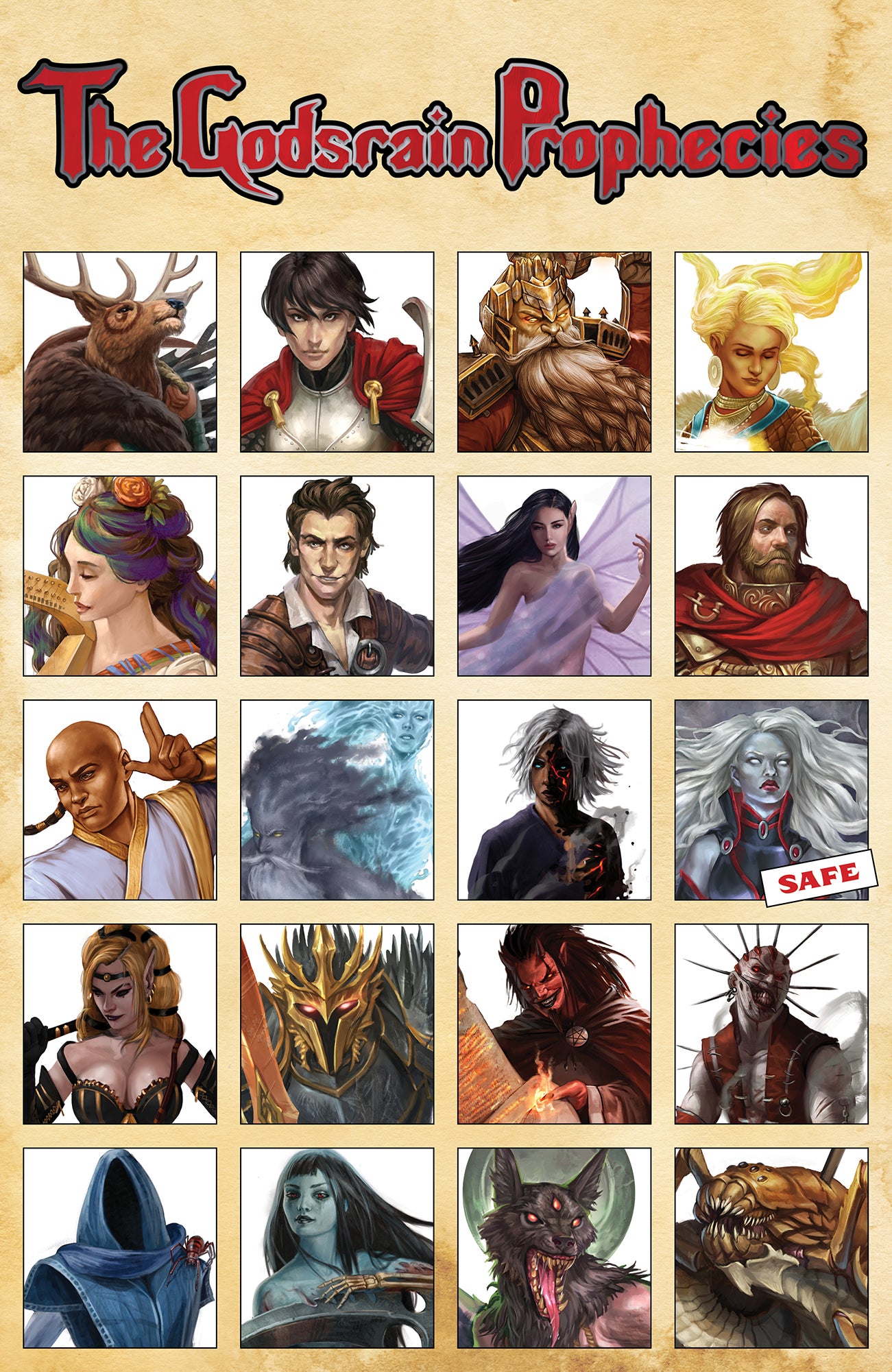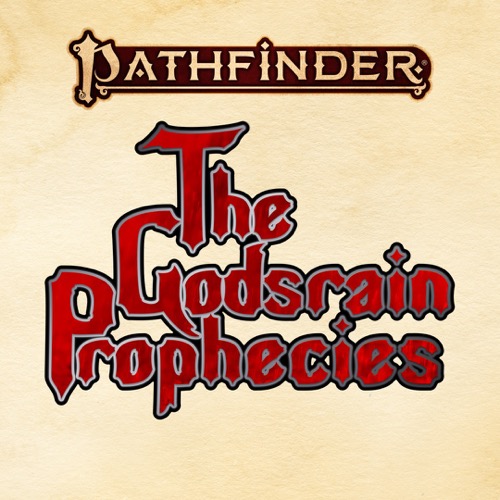I begin my annotation holding death between my talons. An overly poetic beginning, that, and one I will certainly change when I report back to my Lady. Perhaps this a consequence of reading the Godsrain Prophecies, each with its dire tale of the death of a god and everything that comes after. I am reminded of the year I read What Comes Down: A Treatise on Mortal Falls and used the word defenestrate so often in my papers that Lorminos asked me to limit the word to once per page at most!
As my earlier field notes on these works detail, I learned of the Godsrain Prophecies not long ago, and have acted with great haste to locate as many as possible, despite my many doubts as to their accuracy. I must confess that I have also felt a certain unanticipated exhilaration in bringing rigor to a rumor, despite the grim contents of the documents once discovered. I believe that I may almost understand the impulse of adventurers (a mortal drive that remains an obscure field of study), though I likely took as much joy from detailing my methods as I did in undertaking them. Research rarely moves at such a rapid pace, but then rarely has any researcher been so motivated!
What to make of these “prophecies” is a wholly different matter, and one that I must settle before reporting to my Lady, lest I stir up visions of doom with no attempt at context or framing, no better than a doomsday caller singing in the streets! Any thought of these being accurate seems at first impossible, given the current failure of prophecy overall, and their author has yet to be identified. I immediately recall the many false omens in the years after Aroden’s death, many of which had Golarion perishing brutally a thousand times (and will one day, I assume, make for a fascinating set of studies).
Still, there is something about these pages that makes me ill at ease. The detail, perhaps, or the nature of the futures they forecast. This is heightened, of course, by the subject of the first of them, which I hoped never to find but must still document faithfully, as I have below. Perhaps the thing that troubles me lies in this simple question: how do you tell your Lady that she’s prophesied to die?
—Yivali, Apprentice Researcher for the Lady of Graves
The Death of Pharasma
When Pharasma dies, she dies by inches. She grasps for a prophecy beyond her reach and the skin on her fingertips blisters. She dreams the lost feeling of futures foretold and wakes with a tooth ground to ashes. She feels an uncertainty chilling the air, and her bones grow cold and brittle. What changed with Aroden’s death? Why has prophecy faltered? The questions race and turn and tumble, edges carving at her mind as she tries to judge the mortal souls whose futures she’s unsure of.
Is it any wonder that she shatters?
The god they called Survivor dies alone inside her palace—cold, exhausted, broken. No psychopomps to judge her works, no Atropos to take her reign. Most of her servants lose their power in the instant she dies, and no one comes to place her in a plane for all eternity. The fear of how she might be judged has kept her upright more than once, but in the end it’s simply this—she is and then she isn’t. Pharasma ceases to be.
Death does not pause for the Lady of Graves. Death does not stop for anyone. Mortals succumb to the usual things—some in the arms of those who loved them, some at the hands of those who did not. Some in a show of bravery, some in a haze of regret, some drenched hot with sweat or fear or love or loss or anger. All plunge into the River of Souls like jagged rocks sent tumbling, leaving eddies in their wake that shift and roil the current. The river churns with energy, a swirling froth of rapids, throwing souls from in its midst with no set rhyme or reason. The guardians who watch it pass are nothing more than onlookers, as this soul bound for Heaven is shunted off to Abaddon, and that one at the brink of Hell is flung into Nirvana. With souls no longer guided to the places where they’re most aligned, the outer planes turn turbulent, splintering to factions where they once found harmony. Fights break out, and rescue missions; pacts and trades and promises no sooner made than torn apart—a muddied bloodied mess of souls askew for all eternity.
Pharasma’s former psychopomps, distracted by the chaos or the torrents of the river or the sorrow of their grief, rarely see the predators who feast within the river’s wake—daemons and worse who grab souls up by the handful, taking them to sell or gift or simply disappear with.
Among the mortals, resurrections now begin to falter, as souls are often missing from the places where they’re sought. Even for those who never cared a moment for Pharasmin things, the new finality of death leaves many saying prayers for Pharasma, desperate for a sign that she might one day still reach out.
Her followers are hardest hit—the clerics and diviners, the midwives and morticians—their boons no longer functioning, their spells bereft of power. Those who battle the undead see their advantage dissipate, and some who cannot fight or flee fall easily to undead foes, their victories turned to slaughters in a hundred grim tableaus.
Urgathoa laughs, heartily, to see a foe defeated, declaring 50 days of feasts and manifesting blood-soaked wine in any empty cup. She calls upon her followers to press their new advantages, as those who fought her worshippers are left to face a reckoning—some turning to another god whose purpose fits their calling, some searching for a prophecy or ritual or sacrifice that might bring back Pharasma and the surety she gave them, some finding other pledges for their cause.
Above it all, a visage hangs and grins upon the chaos—Groetus watching eagerly from just above the Spire. Some say the crescent of his moon begins to wax in earnest, as we move ever closer to the end times he desires.

A prophecy foretelling the death of Pharasma specifically caused by the death of prophecy in the Age of Lost Omens certainly poses a paradox.
An unpleasant future, to say the least. I shudder to think of it! Thankfully, much of this prophecy remains questionable at best. Not only are there are many questions raised here, including the likeliness of my fellow psychopomps to simply cease their work and let souls be ravaged, whatever their grief, but this also appears to note the cause of my Lady’s death as indirectly caused by the end of prophecy. And yet if there is no prophecy, then how has this one come to be? A paradox, if I ever knew one, and one that I cannot yet untangle. Perhaps my next annotation will offer greater clarity.
About the Author
Erin Roberts has been thrilled to be able to contribute a few small threads to the fabric of Golarion in the pages of books like Pathfinder Lost Omens Firebrands, Pathfinder Lost Omens Highhelm, and Pathfinder Lost Omens Travel Guide. In addition to her work for Paizo, she freelances across the TTRPG world (and was selected as a Diana Jones Award Emerging Designer Program Winner in 2023), has had fiction published in magazines including Asimov’s Science Fiction, Clarkesworld, and The Dark, and talks about writing every week on the Writing Excuses podcast. Catch up with her latest at linktr.ee/erinroberts.













